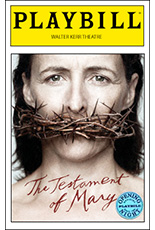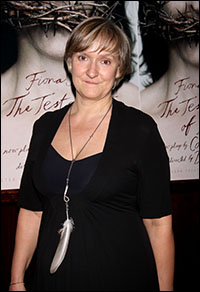
*
The most unnoticed irony in life may well be the fact that the best-known Mary of all time is also the least-known Mary of all time, certainly the least documented--idolized and iconicized okay, but not really humanly known—that is, until now.
Into this bottomless pit of speculation and fiction has leapt Irish writer Colm Tóibín to fill in the Carlsbad Cavern-sized holes surrounding history's most misunderstood and mined plot-peg, giving her the voice of the great Fiona Shaw, who delivers The Testament of Mary at the Walter Kerr Theatre, which opened April 22, in achingly accessible terms.
The Mary that Toibin has wholly imagined has taken up residence in Ephesus after the Crucifixion. Her home seems to be a world of easy anachronisms—water faucet and folding chairs and unfiltered cigarettes—on a sparsely appointed stage.
Off to the side is an empty, throne-like chair "that love once filled," but she is shrilly assured by the believers, "Your son is coming back!" To head off further discussion of the matter, she airily announces, "It's for my husband," halting the talk totally. This missing son is never mentioned by name, making the unrelenting grief of Mary much the same as Everymother's. Certainly, her understanding of her son's world is whittled down to a maternal view. Of the questionable company he keeps, she observes, "He gathered around him, I said, a group of misfits, only children like himself, or men without fathers, or men who could not look a woman in the eye, men who were seen smiling to themselves." She shrugs helplessly, knowingly.
A mother like this is going to miss her son's greatness completely. When people assure her the life, teachings and example of her boy is going to change the world, she is visibly taken aback. "All of it?" she asks in disbelief, denying him full credit.
[flipbook]
Our first view of her is Mary-under-glass, and audiences are invited to file by one at a time to see Shaw puttering about mundanely inside a glass cage. When all return to their seats, the cage slowly rises, and the actress, simply attired in a schmatta of mourning black, strolls regally off stage—oh, with a flighty vulture on her arm.
When she returns to the stage, the games begin—finding fresh, contemporary ways of reciting a numbingly familiar story. Taking it from a mother's perspective almost makes it The Greatest Story Never Told—never till now. And now that it can be told, Shaw tells all, and, in one instance, bares all, in her all-stops-out fashion.
"There are lines I thought would be said in one way, and Fiona is managing to say them in about three ways," said author Toibin with awe that seems quite authentic. "She has found a dominant way, and, under that, she has found levels of ambiguity in a tiny thing she can do with her hand, with her eyes or, in the voice, up or down.
"In a way, when you're writing, all you can do is try and create sentences or images that are open to that rather than ones that you know how they should be performed, so I'm being surprised—I mean, I'm being really surprised—and what's surprising isn't that she's finding a single way to do what I wrote that's different from what I've imagined but she's finding a number of ways. Within each moment, she's capturing pain, almost humor, and then off she goes, building up and down. You're seeing a pure vulnerability at work as well as a pure power. Now that is an amazingly difficult thing to do. It's in the writing, but only in the way that the writing's open. I didn't think of that sometimes when I'm writing a sentence—that it could be interpreted in both of those ways by some movement or some inflection of the voice. You can't really put in those gradations. All you can do is leave them open enough."
He apparently left it open wide enough that the Outer Critics Circle count it one of the Best Plays of the year, and not just a vehicle for an extraordinary actress. But make no mistake about it: that's how Testament took off. "I was thinking about an actress such as Fiona, who needs those great parts like Medea and Electra and Mother Courage and Hedda Gabler. Shakespeare wrote very few of them—perhaps Gertrude, maybe Hermione—then it struck me in one second: there is an interesting one—the voice of Mary. If the voice of Mary could be re-created and that story could be told from her point of view, you could actually do a great part for a great actress."

Buy this Limited Collector's Edition |
Not this lapsed Catholic, said Toibin. "I'm a more common kind of Catholic these days—especially in our world—than the other kind of Catholic. I think that's why the Pope is worried—because there are so many of us out there who are lapsed."
Fiona Shaw turned out not to be the first to voice The Testament of Mary. That distinction went to Marie Mullen, who collected a 1988 Best Actress Tony for The Beauty Queen of Leenane — when the play had its world premiere in Dublin.
"Then I went back to the story again," Toibin remembered, "and added to it and did all sorts of things to it that made it into what I would call a novel, but other people would call a novella, and this was then published. Then I went back to it again, this time with Fiona and [director] Deborah [Warner], to create this text for the theatre."
Warner has been directing Fiona Shaw to great performances for a quarter of a century, so you would think each knows where the buttons are to be pushed and when. "Actually, we're very formal," Warner surprisingly put forth. "We know each other very, very well, but we're incredibly formal within the room. I think people who watch us think, 'Do these two people know each other?' We really do know each other. There's a formality. We don't enforce it. It just comes in. "But there's also a shared appetite for adventure. For sure, there is. And there is the trust, I suppose, that allows each of us to be braver than we'd be without the other. People explore that kind of feeling. Those people who go off into the unknown who try to find the new mountain or the new world. You do tend to choose—all those who choose to climb difficult mountains—you choose good climbing partners. You choose people you've been with before. You do not choose a new team and hope they know the ropes. So I think it's a massively exciting challenge that lies in this. We couldn't have done this if we hadn't done 25 years of this stuff together."
So how long have they been working on their current teaming? "Well, intensively, six months," Warner estimated, "but certainly it's been in the air for a full year since Scott Rudin approached me. Even before that, it was swimming around in the ether."
 |
||
| Deborah Warner |
||
| Photo by Joseph Marzullo/WENN |
"It's been really challenging. The wonderful thing, of course, has been doing it with Deborah, whom I trust with my life. She hears the bum notes, she hears the thing that isn't true, she watches like a hawk. When you feel you're being naturally looked after, you feel it's worth going into the danger of the zone. It's quite scary, actually!"
Telling this story from a mother's point of view permits her considerable latitude, she contended. "Y'know, a mother doesn't have to be polite about her son. She loves him, but that doesn't mean she likes him. And he doesn't do anything very likable—for her—so, in that way, it's quite abrasive, but it's not alienating, I hope. I mean, she says it in other bits. She loves him, and she watches him die. It's absolute agony."
Shaw plans to take a break from acting after this engagement and will direct The Rape of Lucrecia for Glyndebourne when she gets back to England, but in December she will boomerang back to BAM to do Samuel Taylor Coleridge's poem, The Rime of the Ancient Mariner. No rest, evidently, for the insanely gifted.
Among the opening-night crowd at the Sardi's after-party were an interesting two (Salman Rushdie and Carrie Fisher), a definite two (Jesse Tyler Ferguson and Justin Mikita), Martha Plimpton and, declining to be photographed, the youngest of 'em all: Dakota Fanning, all of 19.




























